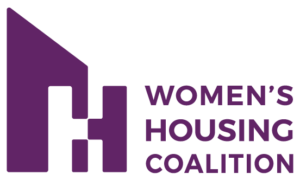by Admin | Feb 19, 2019 | Uncategorized
Finding a home is a person’s most important expense. A home allows people to have a sense of stability to think about other aspects of life, like finding better jobs and making sure their children are successful in school. When people are unable to find safe, affordable housing, it places them at risk of becoming homeless, and then it becomes next to impossible to think about anything else. Nationally, approximately 14.4 million families have critical housing needs. An estimated 328,000 units would need to be built each year to address the growing need for affordable housing.
In Baltimore, nearly 1/2 of residents live below 200% of the federal poverty line. This means that finding affordable housing is increasingly difficult. Maryland overall, ranked 5th in the nation in a study measuring 2-Bedroom Housing Wage from highest to lowest. The study included the District of Columbia and Puerto Rico. So how can we correct this growing problem and end homelessness? City Council Bill 18-038 is an integral step in fixing this growing epidemic. The bill prohibits landlords and other property owners from discriminating against persons seeking housing based on their “source of income.” It requires landlords to judge potential tenants based on past rental history; ability to comply with the lease; and stability and security of the renter’s income. The bill bans the widespread practice of refusing to rent to families enrolled in the Housing Choice Voucher.
Source of income discrimination affects vulnerable populations like senior citizens, people with disabilities, single mothers, veterans, and lower wage workers, many of whom use housing vouchers because their incomes are not high enough to pay the full rent. The Baltimore City Housing Authority (HABC) administers over 16,000 housing vouchers with thousands more on the waiting list. This bill ensures that people will have a fair chance at getting affordable housing and economic opportunities. Here at WHC, we think this bill is an important step in addressing the homelessness epidemic and helping our residents secure affordable housing, We are looking forward to the next steps in the process of ending homelessness forever.
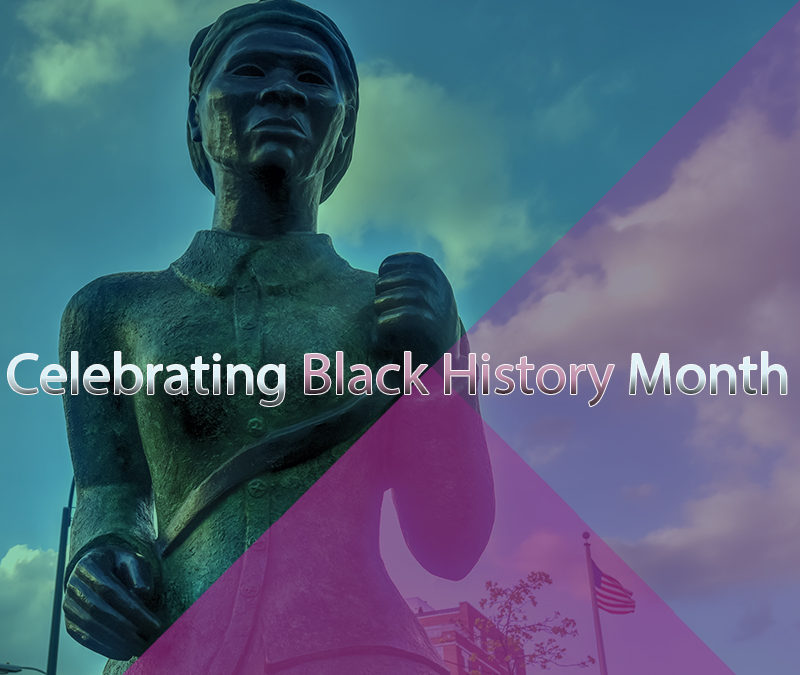
by Admin | Feb 19, 2019 | Uncategorized
February is Black History Month. Here at WHC, we are celebrating the many amazing contributions and lives of black women. All month long, we will be highlighting some of these women on Facebook and Instagram as our #WomenCrushWednesday. We are celebrating women like Fannie Lou Hamer, who was a civil, women’s and voting rights activist, who fought for equality; women like Jane Bolin, who was the first African-American woman to graduate from Yale Law, the first to join the New York Bar Association, the first to join the New York City police department and the first to serve as a judge in the U.S.; and women like Juanita Jackson Mitchell, who was the first African American woman to practice law in Maryland.
Here at WHC, approximately 82% of our residents identify as black. It is important for us share their history and help them see that incredible things are possible. By highlighting these amazing women who look like them, we assist them in regaining a sense of self, a sense of pride, and a way to see their value in the community. We are blessed to highlight some of the well known and relatively unknown black women who have shaped our society. So look at each of our #WCW posts, take in a bit of history, and help us celebrate the difference the women we honor made in our communities and our world.
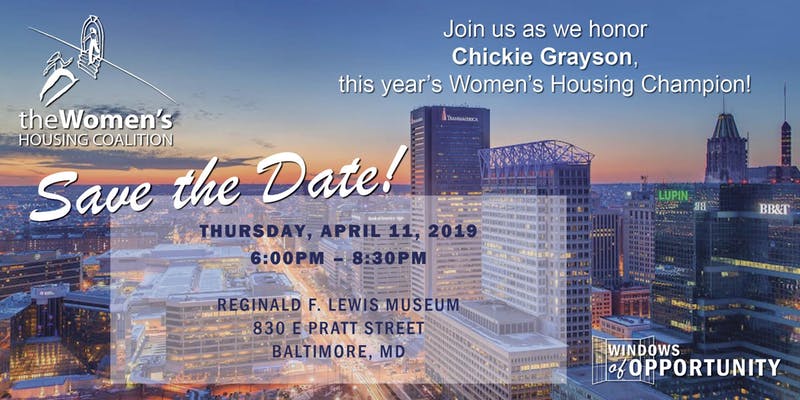
by Admin | Feb 6, 2019 | Events, Uncategorized
Join us for the evening and enjoy heavy hors d’oeuvres and an open bar. Mingle, listen to music, and cheer on this year’s Women’s Housing Champion – Chickie Grayson.
All funds raised support the Women’s Housing Coalition in breaking the cycle of homelessness for the women and children we serve.
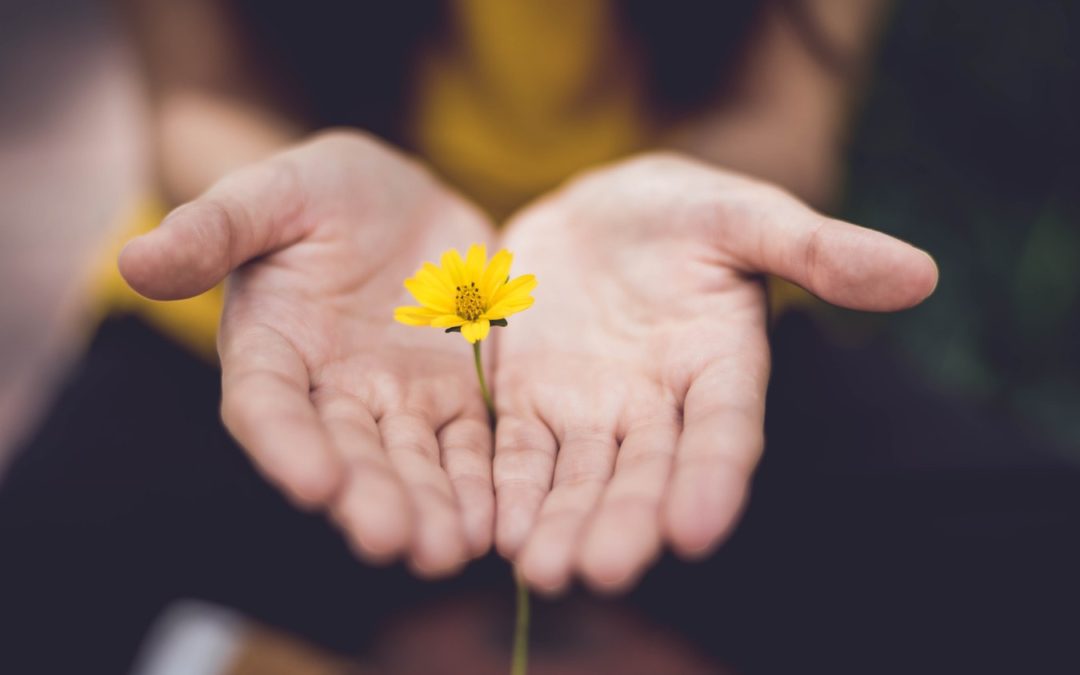
by Admin | Jan 24, 2019 | Resident Story, Uncategorized
During the holidays our sense of compassion and humanity is heightened. We become more aware of the world around us and the people we tend to overlook. We spend more time trying to give back to the people who need it the most. We donate on Giving Tuesday, drop off items at our local thrift store and volunteer at soup kitchens to help spread the joy of the holidays.
But giving and helping shouldn’t stop at the holidays. Donations are the lifeblood of all non-profit organizations. They help organizations like ours provide services to communities and people who they are dedicated to help. Donations help organizations like ours provide goods and services like permanent affordable housing and supportive services that enable the people we serve to become socially and financially independent. Without your help, these organizations may not be able to continue their life changing work.
Here at the Women’s Housing Coalition, we are dedicated to our work of breaking the cycle of homelessness for women and children year-round. We need your help to make our mission a continued success. Our women and children are in need of many items for their day-to-day living. You can donate items from our wish list and help provide basic comforts to the families we help. You can also send monthly donations, give legacy donations; and more. Find out all the ways to give today.

by Admin | Jan 15, 2019 | Uncategorized
Have you made any New Year’s Resolutions this year? It’s January and most of us are using this month to make a fresh start and work on some resolutions for the year ahead. For us, that often means setting goals around self-improvement, our careers, or giving back to our communities. Some years we live up to those resolutions. Often, however, resolutions fall by the wayside. For our residents, goals are an important part of their journey to stability.
Here at WHC, our residents have their own version of personal goal setting. Twice a year each case manager sits down with their residents to create their Individual Service Plans. Each resident’s plan will contain individual goals that they set for themselves to accomplish within 6 months. These goals are self-determined and are steps in helping them stay housed or gain the skills they need to remain housed.
What does that look like? For some it is staying sober for one day at a time (and then the next and the next) or to get back up if they fall off their sobriety. For others it is about letting go of the guilt that has them spend rent money on their children instead of paying the rent. For others, it is working on trust and being able to open up to their case manager. For a few it might be about learning what their triggers are that set off anger or mental health relapses. Others are working on educational goals, getting and keeping a job, pulling together the information needed and applying for disability, or learning where resources are to help them stretch their $179/month income by getting free healthy food or free/low cost clothing.
When you look at this list and compare them to our goals, you realize how hard their work is and how important it is for the WHC to help them set and achieve their goals. It also makes you realize how blessed we are and how helping someone in need can really change their life one step, one goal, one door of change at a time!
by Admin | Dec 18, 2018 | Uncategorized
Every Dollar Counts
“Coming here I believed that they saved my life because the path I was going down was not a good path, and here is teaching me how to be responsible and a productive member of society again.” —Leslie, WHC resident
These are not easy times we live in. On any given night, over 2,500 people in Baltimore City experience homelessness, and Baltimore is not alone. At least 1,416,908 people in the United States experienced homelessness at some point during 2017. Fellow humans who are struggling in poverty and experiencing homelessness are all around us.
On most days there’s a man who stands on our street corner, soliciting help. He politely holds his sign and gives a little head nod of resignation if you say you don’t have anything to give him. When we had our first snowfall of the season, really our first snow/sleet/rain of the season, the man was notably absent from the corner. I couldn’t help wondering where he was. Had he made it into one of the city’s emergency shelters? Was he huddled under a highway overpass trying to stay dry? Was there anyone there to help him? Because of your support, the Women’s Housing Coalition is there to help some of Baltimore’s most vulnerable citizens – women and children experiencing homelessness.
WHC residents have a safe, warm place to sleep each night. They don’t have to worry about whether or not they can get into an emergency shelter when it snows, or whether they will be safe if they fall asleep. They have a home with us. This is invaluable. As one of our residents, Geraldine, noted, “I didn’t realize how tense I was just going to and from a transitional shelter … here it’s just, you’re a normal human being. I think the best word to describe it is freedom. Freedom to be myself.”
Can you imagine not feeling like a normal human being? Because of your generous donations, we are able to provide housing and essential supportive services for our residents. Your generosity gives women like Lavonyer the potential to change their lives through a variety of onsite programming, activities, and case management.
Lavonyer told us that with our supportive services, “You will be able to make amazing changes for yourself and grow.” Can you imagine your life had you not been given opportunities to change and grow? With your donation, we can continue offering housing and supportive services. For roughly $15,000 per person, we are able to house and provide supportive services for an entire year. $1,000 covers one parenting class for 10 families. For $100 we can provide a welcome basket to a new resident that includes basket, sheet set, towel set, laundry detergent, pillow, soap, and more. For $250 we can provide a month of case management for a resident. Any amount can help the lives of our residents. Be the difference for that one woman or child. Support the Women’s Housing Coalition this year.
Donate Today
Beth Benner
Executive Director
by Admin | Dec 18, 2018 | Uncategorized
Looking for a way to make your donation do more? It’s worth asking your employer if they participate in gift matching: where companies match their employees’ donations to non-profit organizations. 65% of Fortune 500 companies and many other smaller companies match employee donations to a wide range of nonprofits.
Some companies will match gifts dollar-for-dollar; others will even triple the amount! Imagine the impact that your donation can make on our organization. Now double it. Now triple it! All you need to do is obtain the appropriate form from your company, complete your portion, and send it to us! An estimated $6-$10 billion in matching gifts goes unclaimed per year. All you have to do is ask for it!
This holiday season, when you give back, make your money go the extra mile. Matching gifts are an easy and efficient way to do just that! The Women’s Housing Coalition would love to be an organization you support this holiday season. Learn how you can help here.

by Admin | Oct 27, 2018 | Uncategorized
Like us, you’ve probably been swept up in the current discussions surrounding sexual assault and the #MeToo movement.
We recently came across an article and a social media post about an experiment Social Researcher Jackson Katz frequently does in his classes & speeches. He first asks the male classmates what they do in order to prevent sexual assault from happening to them. Most do not answer, and usually one will raise their hand and say “nothing” or that “I don’t think about it.”
Once the men have had a chance to answer, Professor Katz then asks the female classmates to answer the same question, to which he receives dozens of different answers. Answers include: have a big dog, lock the car doors when you get in, don’t walk alone, let family members know where you are at all times, don’t use rest areas…and the list goes on and on.
What an eye-opening experiment to show just how pervasive sexual assault is for women. The vast majority of women take extra precautions throughout the day to prevent a sexual assault from happening to them, but men just don’t think about it. When you read the article, it is clear that women feel an obligation to keep themselves safe and that when their precautions fail they are even more reluctant to come forward because they will be blamed! Somehow women have all been trained to think it is our personal obligation to keep ourselves ‘safe’. We do not see this as a failure of society to keep everyone safe, but it is.
This provides just a small insight as to the additional complexity surrounding being homeless and female. Consider adding the sense of failure in your own ability to keep yourself safe with experiencing homelessness. Even when our residents join us and have that permanent roof over their heads, there are a lot of issues to unpack and work through. They have to unpack the issues that lead to homelessness. If a sexual assault occurred before, during, or after they experienced homelessness, they have to unpack and work through that. Women face a complexity of physical, mental, and emotional issues to work through before they have a chance at remaining stably housed and leading a fulfilled life.
We are living in a time when women’s voices need to be heard more than ever, and we must keep pushing to ensure women who have experienced sexual assaults have a voice in the national discourse. If you care about any of these issues, consider having your voice heard, speak up, support people, make a donation.
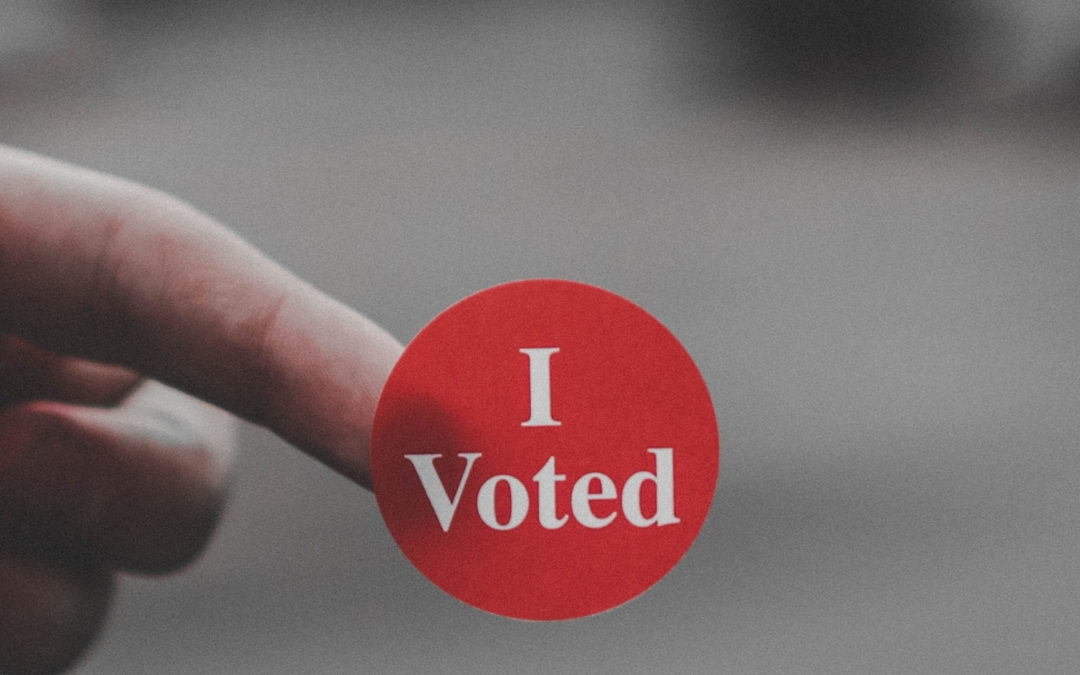
by Admin | Oct 20, 2018 | Uncategorized
Midterm elections are right around the corner and voter turnout during midterm elections is notoriously low. Only about 40% of eligible voters participate in midterms, while during presidential elections it ranges from 50-60%.
The importance of all eligible voters showing up to vote, in midterm and presidential elections, is not lost on any of us. When November 6th rolls around, it’s important that as many people as possible have the opportunity to get to the polls to vote; however for low-income and poverty-level individuals, it’s easier said than done.
For many of our residents who work hourly or part-time jobs, their employers do not give them time off from work to vote. Taking time from their day to go to their polling place to vote could mean a loss of wages for many. Whereas, many full-time employees have the opportunity to leave work and vote.
To compound the situation, many people, including some of our residents, do not have transportation to take them to their designated polling place. For those who use public transportation here in Baltimore, you know how limited the bus lines can be, which can make going anywhere a full-day experience.
We are committed to ensuring our residents know how they can register to vote and where their polling places are and to giving them options on how they can vote. We need to work together to ensure that more low-income communities and individuals are voting on election day!
by Admin | Sep 12, 2018 | Uncategorized
Thanks to a grant we received from the Baltimore Women’s Giving Circle this summer, we have been able to add a new member to the WHC team! We are pleased to introduce Maria Wetherington, our new family case manager.
Before our new case manager hire, we had one family case manager who was handling all 17 current families being served by WHC. On average, our case manager was working with 35+ people! As you can imagine, that stretched our case manager thin. They weren’t able to dedicate enough individualized attention to the women and their families.
With the grant money we received from the Baltimore Women’s Giving Circle, our two case managers will be able to provide our families with more individualized attention. The goal of our family case managers is to support both our parents and our children as much as possible so the family can thrive. By distributing the number of families served between the two case managers, this will certainly help them to do that!
We are so thankful for the opportunity to add another family case manager to the WHC team! Learn more about what programs we offer to our residents here.
